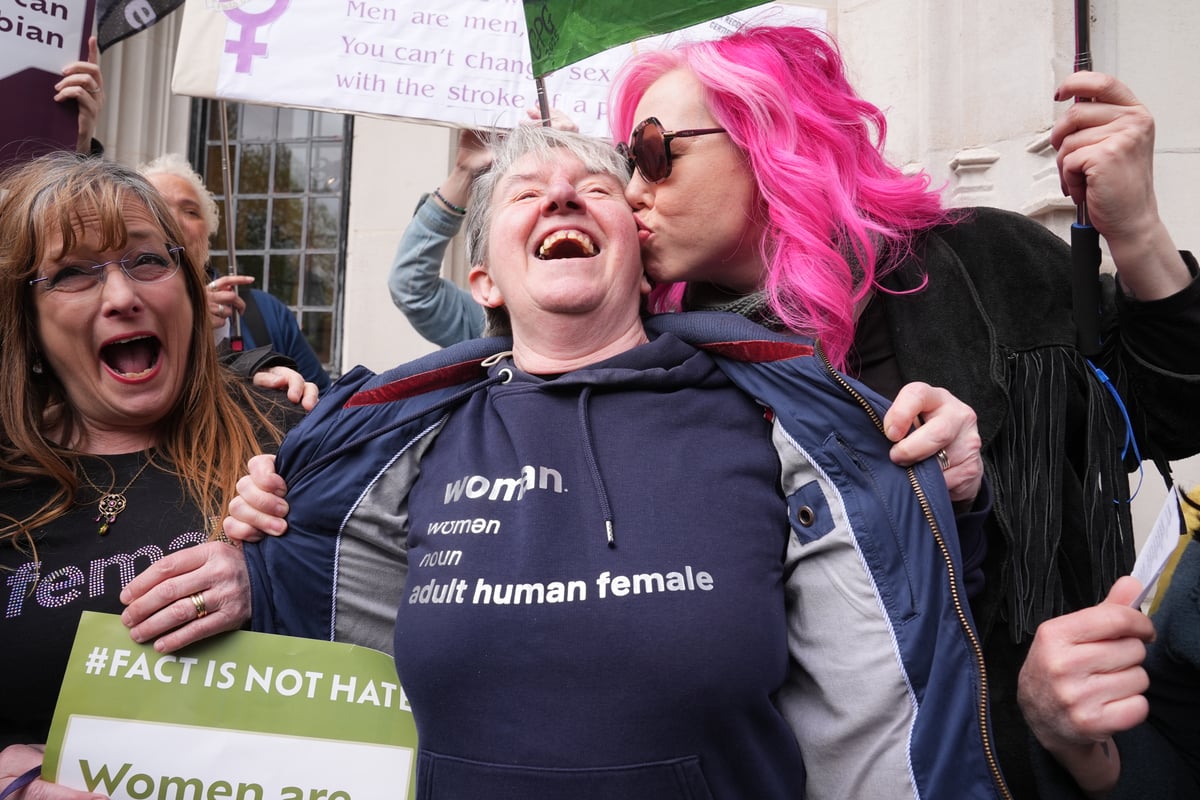A Supreme Court ruling backing the biological definition of “woman” under the Equality Act has been described as an “abject humiliation” for the Scottish Government. Campaign group For Women Scotland (FWS) brought a series of challenges – including to the UK’s highest court – over the definition of “woman” in Scottish legislation mandating 50 per cent female representation on public boards. READ MORE: UK Supreme Court rules women in the Equality Act refers to biological sex The row centred on whether trans women should be regarded as female for the purposes of the 2010 Equality Act, as argued by SNP ministers.
Judges unanimously sided with FWS. The group previously said not tying the definition of sex to its “ordinary meaning” could have far-reaching consequences for sex-based rights, as well as “everyday single-sex services” like toilets and hospital wards. Writing on social media, the charity Scottish Trans urged people “not to panic” in the wake of the ruling.

It said: “We’d urge people not to panic - there will be lots of commentary coming out quickly that is likely to deliberately overstate the impact that this decision is going to have on all trans people’s lives.” READ MORE: The key points from UK Supreme Court ruling on gender 'definition of a woman' For Women Scotland case In a statement, FWS said policies based on self-identification remain in place across the UK, in hospitals, police forces, schools and prisons. It said: “The UK and devolved governments, and the Equalities and Human Rights Commission, need to take responsibility for their role in this, take urgent steps to clear up the confusion, and ensure the ruling has effect on the ground.
” Susan Smith, a director of the group, told journalists: “In Scotland specifically, I think what our politicians need to get their heads around is this is the law, and they need to stop pushing faulty guidance into schools and hospitals.” She said there is going to be “ongoing fight” to get these policies “out of these places”. READ MORE: Supreme Court gender verdict on definition of a woman due - here's what it will mean Scottish Conservative leader Russell Findlay said: “This is a victory for women across the United Kingdom, a victory for common sense – and an abject humiliation for the SNP.
“John Swinney now needs to respect women’s rights and get rid of the dangerous gender policies which have become embedded in Scotland’s public institutions. “This ruling should sound the death knell once and for all for Nicola Sturgeon’s reckless self-ID plans, which Labour, the Liberal Democrats and the Greens shamefully backed to the hilt at Holyrood. “John Swinney must stop obsessing about gender and get back to the day job of delivering better public services and a stronger economy.
Too much time, energy and taxpayers’ money has been wasted on the divisive issue of gender ideology.” Campaign group Sex Matters, which had made arguments in the case, said the court had given “the right answer”. Maya Forstater, the group’s chief executive, said: “We are delighted that the Supreme Court has accepted the arguments of For Women Scotland and rejected the position of the Scottish Government.
“The court has given us the right answer: the protected characteristic of sex – male and female – refers to reality, not to paperwork.” The LGB Alliance charity said the ruling “marks a watershed for women”. Chief executive Kate Barker said: “The ruling confirms that the words ‘gay’ and ‘lesbian’ refer to same-sex sexual orientation and makes it absolutely clear that lesbians wishing to form associations of any size are lawfully entitled to exclude men – whether or not they possess a GRC (gender recognition certificate).
“It is difficult to express the significance of this ruling: it marks a watershed for women and, in particular, lesbians who have seen their rights and identities steadily stolen from them over the last decade.” Baroness Kishwer Falkner, chairwoman of the Equality and Human Rights Commission, said: “Today the Supreme Court ruled that a gender recognition certificate does not change a person’s legal sex for the purposes of the Equality Act. “We are pleased that this judgment addresses several of the difficulties we highlighted in our submission to the court, including the challenges faced by those seeking to maintain single-sex spaces, and the rights of same-sex attracted persons to form associations.
“As we did not receive the judgment in advance, we will make a more detailed statement once we have had time to consider its implications in full.” But Scottish Greens MSP Maggie Chapman said: “This is a deeply concerning ruling for human rights and a huge blow to some of the most marginalised people in our society. “It could remove important protections and will leave many trans people and their loved ones deeply anxious and worried about how their lives will be affected and about what will come next.
“Trans people just want to be able to live their lives like any of us, without the fear of prejudice or violence, but today they have been badly let down. “Trans people have been cynically targeted and demonised by politicians and large parts of the media for far too long. This has contributed to attacks on longstanding rights and attempts to erase their existence altogether.
“Whatever happens next, we will continue to stand with trans people and resist the nasty and aggressive culture war that is being waged against them and challenge any attempts to remove their rights. “We will always stand up for human rights, dignity and respect for all people. We will stand with the trans community today, tomorrow and always.
” Lord Hodge, sitting with Lords Reed and Lloyd-Jones alongside Ladies Rose and Simler, said the “central question” is how the words “woman” and “sex” are defined in the 2010 Equality Act. He continued: “The terms woman and sex in the Equality Act 2010 refer to a biological woman and biological sex.” In an 88-page judgment, Lord Hodge, Lady Rose and Lady Simler said that while the word “biological” does not appear in the definition of man or woman in the Equality Act, “the ordinary meaning of those plain and unambiguous words corresponds with the biological characteristics that make an individual a man or a woman”.
The justices added that interpreting biological sex with GRCs would “cut across the definition of the protected characteristic of sex in an incoherent way”. They continued: “We can identify no good reason why the legislature should have intended that sex-based rights and protections under the EA 2010 should apply to these complex, heterogenous groupings, rather than to the distinct group of, biological, women and girls, or men and boys, with their shared biology leading to shared disadvantage and discrimination faced by them as a distinct group.” The justices said that transgender people are still protected from discrimination, but that “gender reassignment and sex are separate bases for discrimination and inequality”.
They added: “The interpretation of the Equality Act 2010, ie the biological sex reading, which we conclude is the only correct one, does not cause disadvantage to trans people, with or without a GRC. “In the light of case law interpreting the relevant provisions, they would be able to invoke the provisions on direct discrimination and harassment, and indirect discrimination.” They also said: “This conclusion does not remove or diminish the important protections available under the Equality Act 2010 for trans people with a GRC as we have explained.
To the contrary, this potentially vulnerable group remains protected in the ways we have described.”.
Environment

Supreme Court UK ruling on definition of woman branded 'abject humiliation for the SNP'

The charity Scottish Trans urged people “not to panic” in the wake of the Supreme Court ruling















